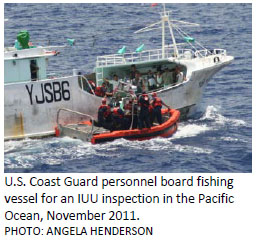Secure Our Ports and Defend U.S. Fishermen
Support the Port State Measures Agreement and Pirate Fishing Elimination Act
 The Pirate Fishing Elimination Act (S. 267) was introduced February 11 by U.S. Sens. Jay Rockefeller (D-W.Va.), Lisa Murkowski (R-Alaska) and eight co-sponsors to implement the United Nations Food and Agriculture Organization's Port State Measures Agreement (PSMA) and to help eliminate illegal, unreported, and unregulated (IUU) fishing.
The Pirate Fishing Elimination Act (S. 267) was introduced February 11 by U.S. Sens. Jay Rockefeller (D-W.Va.), Lisa Murkowski (R-Alaska) and eight co-sponsors to implement the United Nations Food and Agriculture Organization's Port State Measures Agreement (PSMA) and to help eliminate illegal, unreported, and unregulated (IUU) fishing.
What is IUU fishing?
- IUU fishing, sometimes called pirate fishing, is a global problem that poses a serious threat to the commercial viability and environmental sustainability of fish stocks around the world.
- Global economic losses as a result of illegal and unreported fishing are estimated to be as high as $23 billion1 annually.
- Illegal fishers steal 11 million to 26 million tonnes2 of fish from the ocean each year—three to six times more fish than the U.S. commercial fishing fleet catches annually.3
- The U.S. fishing industry supports nearly 1 million American jobs,4 but pirate fishing undermines the competitiveness of U.S. fishermen and seafood purveyors.
- According to a report published by the U.N. Office on Drugs and Crime, IUU fishing operations are clearly linked to criminal syndicates that use fishing vessels to traffic in humans and smuggle drugs.5
How would the PSMA and S. 267 eliminate IUU fishing?
The United States was a principal architect and early signatory of the PSMA, which once it enters into force, will prevent pirate vessels from entering ports all over the world. Closing ports and denying port services such as refueling and resupplying to such vessels is an effective way to combat IUU fishing as it makes it riskier and more expensive for those involved to do business.
Nations that sign onto the PSMA commit to:
- Designate which ports foreign-flagged fishing vessels may enter.
- Require that those vessels provide key information to the port State prior to entry.
- Deny port entry and access to port services to vessels suspected of IUU fishing.
- Set minimum standards for conducting dockside inspections of foreign fishing vessels.
- Require states to share information with other relevant countries and organizations, especially when evidence of IUU fishing is found during an inspection.
How will ratifying PSMA and passing S. 267 help the U.S.?
U.S. ports already comply with many provisions of the PSMA. U.S. ratification would send an important signal that America expects other nations to meet these basic, common-sense standards. IUU operators flout fisheries laws and management measures to increase their take. The result is a glut of IUU fish that depresses the value of legally caught American seafood.
Congressional approval of S. 267 would:
- Affirm U.S. authority to prevent vessels involved in pirate fishing from entering U.S. ports and encourage other nations to hold illegal fishing vessels accountable.
- Protect American fishermen and seafood purveyors by closing U.S. ports to vessels engaged in IUU fishing and by keeping illegal seafood products out of the U.S. market.
- Enhance national security by requiring foreign fishing vessels that are currently exempted to submit advance-notice-of-arrival documents before entering American ports. This would close a loophole that could be exploited by drug traffickers, human smugglers, and terrorists.
Contact Gerry Leape (202.887.1346) for more information.
References:
1. Agnew, D.J. et al. (2009). "Estimating the Worldwide Extent of Illegal Fishing." PLoS ONE. www.plosone.org/article/info:doi/10.1371/journal.pone.0004570.
2 Ibid.
3 U.S. Department of Commerce, National Atmospheric and Oceanographic Administration (2011). Fisheries Economies of the U.S. 2009: Economics and Sociocultural Status and Trends Series. www.st.nmfs.noaa.gov/st5/publication/index.html.
4 Ibid.
5 U.N. Office on Drugs and Crime (2011). Transnational Organized Crime in the Fishing Industry. www.unodc.org/documents/human-trafficking/Issue_Paper_-_TOC_in_the_Fishing_Industry.pdf.






